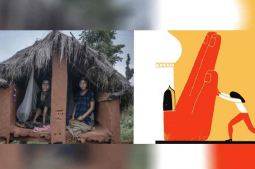Aayusha Pyakurel bags ‘first runner-up title’ at Miss Glam World 2023
9 months ago

The number of cholera cases has been on the rise in and outside the Kathmandu Valley, according to the District Health Office and Epidemiology and Disease Control Division. Many people die from this preventable disease due to the lack of knowledge and in some cases being careless and ignorant.
The testing of water jars, bottles and tankers has been started and Lalitpur Metropolitan City has taken the initiative of banning street food including panipuri. Similarly, Kathmandu Metropolitan City has decided to ban the selling of street foods and monitor the food hygiene in hotels and restaurants, and inspect water pipelines and sewage systems.
Apart from these initiatives, planning and warning of the District Administration Office (DAOs), health experts and the government, are the youths aware about this serious issue? Samiksha Shrestha of My City (Republica) talked to a few youths involved in different sectors of Kathmandu and Lalitpur metropolitan cities to find out how aware youths are about the spread of this disease and do they know the preventive measures and what to do if they get infected? Excerpts:
‘Each one of us needs to be aware of the outbreak but youths appear to be a little irresponsible and prefer eating food off the street’

Sakshyam Joshi, 27, Community Manager at Cloudfactory
I believe that young people are aware of cholera based on my observations and interactions with them as cholera spreads as a result of consuming or drinking contaminated food or water. Each one of us needs to be aware of the cholera outbreak in Nepal in order to protect ourselves, our families, and communities from the serious issue. Most of the youths are aware of the cholera preventive measures, which depend on having access to clean water, adequate sanitation, and key hygiene standards. Young people led organizations/groups at the local level should be involved in developing programs that satisfy needs, such as when and where to seek treatment, as some of the youths appear to be a little irresponsible and prefer eating food off the street, where hygiene may occasionally be a concern. Youths are aware about the key to treatment which is fluid resuscitation, thus the person needs to be brought to the closest medical institution as soon as possible and be given Oral Rehydration Solution (ORS).
'Majority of youths are aware; nonetheless they are not serious about the impact of the disease on their health'

Dr Ujwal Shrestha, 33, MD at UNR Smile Creation Dental Clinic
I do believe to some extent that the majority of young people are aware of the outbreak of cholera in Nepal. But I think that they are not serious about the disease itself as they don't have enough awareness about its effect on our health. Preventive measures such as safe drinking water and improved sanitation and washing hands properly are some of the important factors that help to combat this disease. The young generation seems to have less information about these preventive measures as we can see a lot of them are consuming street food near their schools, colleges, or workplaces. If they get infected they should monitor their symptoms properly and should take plenty of Oral Rehydration Solution (ORS). If the condition of the disease is not improved then they should be taken to the nearby health center or hospital for immediate treatment.
'The communication service provider should set the caller ringtone about cholera prevention just like the awareness about the voting set back then for election'

Luis Shrestha, 27, MBA student, ACE Institute of Management
Seeing the current scenario, I do not think that the majority of the citizens are taking this disease seriously. Majority of educated youths are also ignoring its consequences. Recently a higher number of people residing in Lalitpur Metropolitan were found victims of this disease. Banning pani-puri alone will not stop the disease from spreading because the local tea shops and street food sellers also use the same water and I have seen people consuming those foods and beverages without any fear. Maybe everyone is fearless because they know this disease is curable but what if this disease turns into an epidemic. I am pretty sure that our government is also not well prepared to face that situation. Talking about Kathmandu Metropolitan City, though it is said that they have banned street foods, it has not been implemented strictly. I have not seen any hotels and restaurants being monitored for food safety. Some of them might have applied food safety by themselves but the government has not taken any action yet.
I think to prevent this disease once again awareness about washing hands properly should be conducted in coordination with the health and education sectors together with local government. Another impactful awareness program can be conducted in coordination with the communication service provider by setting the caller ringtone about major prevention that every single person can follow in their home, just like the awareness about the voting was set as caller ringtone back then for election. To primarily target youths and make them aware, awareness campaigns in social media will be best.
'We as the employee of an organization and individuals have implemented various preventive measures starting from avoiding jar water to providing guidelines for all employees in case of being infected'

Diwas Thapa, 31, Managing Director, Talent Connects
Our employees are well aware of the cholera outbreak in the Valley. To prevent the disease from spreading further, we’ve done the following things: switch from jar water to filtered water, avoid eating outside and start bringing home-cooked food for lunch at work, use of clean and hygienic working environment we’ve also provided basic guidelines to all our employees on what to do if they get infected., visit the doctor immediately, take boiled and filtered water with ORS water for immediate recovery, wash the hands and food properly, stay home and take proper rest, keep the kitchen and home clean.
'Youths of this generation are aware as they are a social media-savvy generation that enjoys staying informed about current events and also because they like to keep themselves informed after the Covid-19 pandemic'

Sneha Singh Shakya, 33, HR Deputy Manager at Chaudhary Group
Nepal, as a developing nation, is more susceptible to infection due to poor sewage management and water supply. Most of the time, the infection is mild or asymptomatic, but it can occasionally be severe. One of the measures is a complete ban on selling panipuri and chatpate on the roadsides – spicy street foods mostly popular among the youth. This preventive measure has raised awareness among the youth, prompting them to avoid eating street foods and drink tap water for the sake of their health.
Every young person of this generation is aware of the spread of the cholera infection and is taking precautions to avoid it because they are a social media-savvy generation that enjoys staying informed about current events. Also, because of the COVID-19 pandemic that occurred in the past, everyone takes precautions and keeps themselves informed for a better quality of life.
Fluid and electrolyte replacement are typically used to treat acute diarrheal infections.
If the diarrhea is severe, the patient should speak with their family doctor about the best course of action. The best prevention for diarrhea is to practice proper personal cleanliness, food hygiene, and environmental hygiene. Drinking only clean and safe water, maintaining good hygiene, washing hands frequently, especially before eating and after using the bathroom, and becoming knowledgeable about the spread of infection are all recommended. Rehydrating, eating a healthy diet, taking probiotics, and taking medication as advised by the doctors are all things one should do in case it becomes contaminated.


- by Manawi Shah

- by Samiksha Shrestha

- by Samiksha Shrestha
Leave A Comment